Humans: So prone to homicide! No murders have as yet occurred in any of our space facilities—that we know of, anyway—but given enough time and an expanding pool of potential perpetrators, it stands to reason that murder victims would start turning up sooner or later. As will the poor saps stuck with the unrewarding job of working out who did what to who, why, and what, if anything, can be done about it.
For your delectation, here are five space-based murder mysteries.
Media Man by Joan Vinge (novella first published in Analog, 1976)
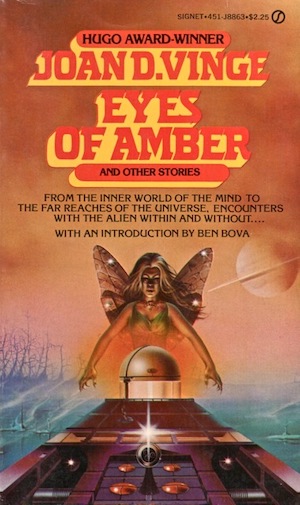
A system-wide civil war reduced the Heaven System to ruins, leaving just a handful of survivors. The Demarchy was lucky. Facing a long, slow decline rather than the abrupt extinction enjoyed by most of Heaven’s inhabitants, the Demarchy provides a luxurious existence for its Demarchs and a miserable one for the other ninety-nine percent.
Spaceship pilot Mythili Fukinuki and Media Man (read: paid shill) Chaim Dartagnan accompany the spoiled Demarch Siamang on what is ostensibly a rescue mission to retrieve marooned space coot Olefin from Planet Two. Demarchs in general and Siamang in particular never do anything for free; the true purpose of the expedition is to further enrich Siamang.
When Siamang, never one for self-control, impulsively murders Olefin in a fit of pique, Fukinuki equally impulsively assures the untouchable oligarch that she will alert the authorities to the crime as soon as the expedition returns to the Demarchy. This bold plan requires the pilot to survive long enough to return to the Demarchy. Unfortunately for her, not only is Dartagnan a boot-licking craven lacky, he’s also a pilot. This means that Fukinuki is entirely surplus to requirements and her life expectancy is accordingly quite low…which is bad news for the budding romance between Dartagnan and Fukinuki.
***
“The Barbie Murders” by John Varley (1978)
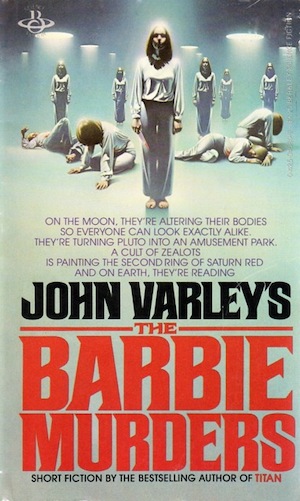
From one point of view, the Moon is a wonderland, with a thriving civilization commanding impressively advanced technology. From another point of view, it’s a hellscape populated by stressed-out people coping with future shock in a number of maladaptive ways. Thus, Moon cop Anna-Louise Bach is assured full employment dealing with tomorrow’s crimes.
Bach has had to deal with nuclear terrorism in the past. Compared to that, simple homicide is a welcome relief. Or it would be, if the victim and killer did not come from an insular cult whose members are identical. As bodies accumulate, Bach struggles to distinguish between murdered and murderer in a community to whom the concept of individual identity is anathema.
[Note for younger readers: no, we didn’t have DNA-testing back in the 1970s when this was written, and apparently neither did Bach’s future.]
***
Murder in Space written by Wesley Ferguson, directed by Steven Hilliard Stern (1985)
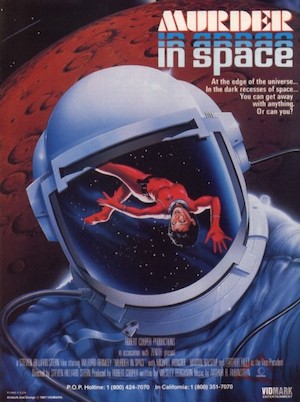
In this Reagan-era CTV (Canadian Television Network) offering, the spacecraft Conestoga and its international crew are returning from Mars to Earth. Before they reach the home world, an explosion rocks the ship. Shortly thereafter, crew corpses start to turn up. All clues point to murder!
The good news: the killer has to be one of the rapidly dwindling number of people on board the Conestoga. In theory, the authorities could simply wait until only the killer or killers remained and then arrest them for homicide. In practice, however, almost everyone, save perhaps for the killer or killers themselves, would prefer for the murderer to be caught while some of the potential victims are still alive.
In an interesting twist, home viewers of this televised space saga competed to solve the mystery, with audience participation encouraged by substantial cash prizes.
***
Places in the Darkness by Christopher Brookmyre (2017)
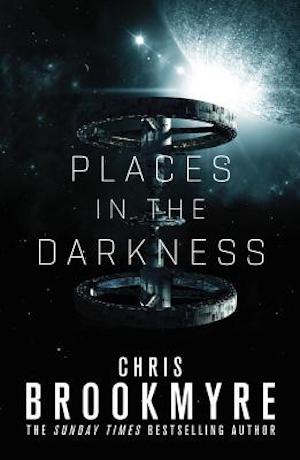
230,000 kilometres above the Earth’s surface, Ciudad de Cielo is filled with almost every vice and foible known to humanity. This is a paradise for bent private cop Nicola “Nikki Fixx” Freeman, because it offers many ways for a high-ranking Seguridad officer to siphon off some extra wealth for herself. The system works, as long as nobody gets too greedy and everyone remembers that there are limits to the crimes to which the authorities can turn a blind eye.
Murder is bad enough. A dead criminal’s flayed, dismembered body is far worse, because not only does it suggest that some ambitious would-be crime lord is greedy enough to set aside conventional limits on competition, but because it could be just the cause célèbre that squeaky-clean criminologist Dr. Alice Blake needs to justify a thorough purge of Ciudad de Cielo’s criminal element. And Nikki is very high on Blake’s purge list.
In fact, there’s more going on than a simple gang war and both crooked cop and idealist investigator will be hard put to survive it…
***
“Waiting on a Bright Moon” by Neon Yang (2017)
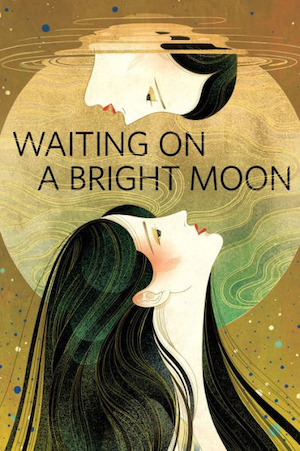
Had she not been a lesbian, Ansible Xin might have been a starmage. She’s too valuable to summarily execute for her forbidden sexual orientation; instead, Xin is stripped of her name and consigned to endless drudgery as a living communications device on Eighth Colony.
Survival under the autocratic Authority means quiet submission. Thus, when a murdered corpse appears on the threshold of an interstellar portal, Xin does not set out, à la Miss Marple, to solve the mystery. Yet this may not suffice to preserve Xin’s life. The Authority is very keen on doling out death penalties on slender pretexts. Clear, provable guilt need not be a factor—Ansible Ren, for example, is executed simply to eliminate the slight possibility that she was tangentially implicated. Bad news for Xin, because Ren was her lover, which could serve as reason enough to liquidate Xin as well.
The standard solution in cases like this is for the accused to catch a killer and so clear their name. The Authority is above such petty concerns as actual guilt. This leaves Xin with a more ambitious option: to mount a revolution against a corrupt, merciless state.
***
No doubt many of you are even now reaching for your keyboards to point out the hundreds of space mysteries and murders I didn’t mention in this five-item piece. The comments are, as ever, below!
In the words of Wikipedia editor TexasAndroid, prolific book reviewer and perennial Darwin Award nominee James Davis Nicoll is of “questionable notability.” His work has appeared in Publishers Weekly and Romantic Times as well as on his own websites, James Nicoll Reviews and Young People Read Old SFF(where he is assisted by editor Karen Lofstrom and web person Adrienne L. Travis). He is a four-time finalist for the Best Fan Writer Hugo Award and is surprisingly flammable.










